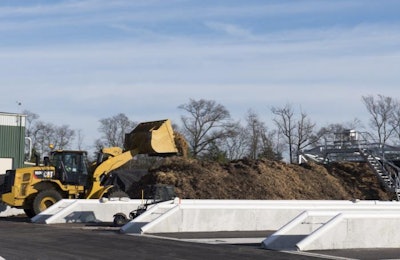
Perdue Farms has expanded its $68 million investment in nutrient recycling on the Delmarva Peninsula with the addition of a $12 million capital investment in a composting operation.
The AgriSoil composting facility, which started operation next to Perdue AgriRecycle’s organic fertilizer plant in Blades, Delaware, increases the company’s capacity to handle surplus poultry litter from Delmarva chicken farms and adds the capability to recycle other agricultural by-products that were previously land-applied.
AgriSoil can compost poultry litter, nutrient-rich by-products such as treated biosolids from poultry plant wastewater, and such other organic material as soybean stems. With the addition of the composting operation, Perdue expects to nearly double the amount of litter and byproducts recycled and relocated to an estimated 80,000 tons per year. Perdue AgriRecycle, which celebrated its 15th anniversary in 2016, already handled more than a billion pounds of poultry litter.
“Our company depends upon farmers, and we all want to protect the Bay,” said Randy Day, chief operating officer, Perdue Farms. “The $80 million we’ve spent so far on nutrient recycling demonstrates our commitment to supporting the economic and environmental sustainability of agriculture and family farms on Delmarva.”
Environmentally responsible alternatives to land application
Just as with poultry litter, most of these other by-products have been land applied, presenting the same risk for nutrient run-off.
“Fifteen years ago, Perdue saw the coming need for an environmentally friendly alternative to land application of poultry litter and built Perdue AgriRecycle,” said Steve Levitsky, vice president of sustainability for Perdue Farms. “Now, we’re taking the same proactive approach to a broader range of byproducts.”
“The Midshore Riverkeeper Conservancy is always looking for solutions to water quality problems caused by excess nutrients,” added Jeffrey Horstman, executive director and Miles-Wye Riverkeeper. “We commend and want to support the efforts of Perdue in their new Agrisoil and existing AgriRecycle initiatives. These efforts, investments and new technologies will reduce water pollution from excess nutrients on the Delmarva, which is very much in line with our mission.”
Organic matter can help improve and restore soils
The AgriSoil process mixes raw material with wood and water from Perdue AgriRecycle’s scrubbers. A special fabric covers the mixture, trapping odors and promoting a natural composting function that breaks down the mixture and destroys pathogens and weed seeds. The process takes 60 to 70 days, naturally heating to 140 to 165 degrees for an extended period of time. The end result is a high-quality composted soil amendment high in organic matter.
The final product will be marketed for commercial use and to distributors of consumer lawn-and-garden products. The compost is especially good for improving sandy soils, restoring depleted soils and as a seedbed.

















